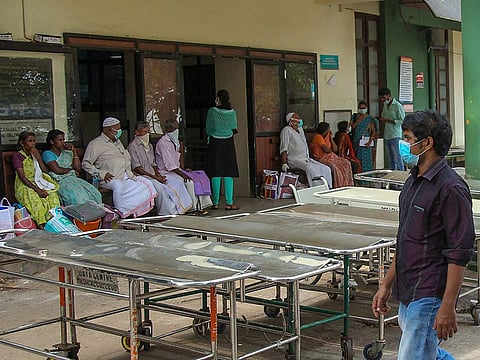Nipah outbreak: Travellers to Kerala asked to avoid 4 districts as virus claims one more life
The death toll due to Nipah rose to 11 in Kerala, with one more person succumbing to the deadly virus

Kozhikode: The death toll due to Nipah rose to 11 in Kerala, with one more person succumbing to the deadly virus in Kozhikode on Thursday. The deceased, V Moosa (61), had been battling for life since the past few days in a private hospital here and was on ventilator support. Kozhikode district medical officer, Dr Jayasree E told reporters.
About 160 samples have been sent for testing at the virology institute and 13 cases have been found to be positive, she said.
Of the 13 confirmed cases, 11 people have died so far.
The official further said confirmation is awaited with regard to one more death in Kozhikode.
This is the fourth death in Moosa's family.Moosa's sons Mohammed Saliah (28), Mohammed Sadiq (26) and a relative Mariumma had died earlier.
Travellers to Kerala asked to avoid these districts
Thiruvananthapuram: Amid the outbreak of the nipah virus in the southern Indian state of Kerala, the state government asked travellers on Wednesday to avoid visiting four northern districts of the state.
Also read:
An advisory issued by state health secretary Rajeev Sadanandan stated that travelling to any part of Kerala was safe.
But if travellers wished to be extra cautious, they could avoid the four districts Kozhikode, Malappuram, Wayanad and Kannur, it said.
"A few cases of infection by nipah virus have been reported from Kozhikode district in Kerala. The infection remains highly localised, all cases being linked to one family," the advisory said.
Surveillance by the government is being conducted in Kozhikode district, from where most of the cases were reported, and in the neighbouring districts of Malappuram, Wayanad and Kannur, it said.
"The health department is taking effective steps for management of reported cases and surveillance through tracing of the contact of these persons. The situation remains under control," the advisory said.
Meanwhile, 2,000 Ribavirin tablets, an antiviral medicine, have already reached Kozhikode.
Another batch of 8,000 tablets are expected to be delivered later in the day, Health department sources said.
Ten people have died of nipah virus so far in Kozhikode and Malappuram districts.
Two others who died of high fever are suspected to have contracted the virus, too.
Nipah virus (NiV) infection is a newly-emerging zoonosis that causes severe disease in both animals and humans.
The natural host of the virus are fruit bats, of the Pteropodidae family, Pteropus genus.
Nipah: Emiratis urged to exercise caution
Dubai: The UAE has urged its citizens in India to exercise caution and abide by the instructions of Indian authorities following the outbreak of the Nipah virus in Kerala.
The UAE Consulate in Kerala has urged Emiratis to register with the Twajudi service, and to contact consulate in the case of an emergency on 00919087777737 or on 80044444.
Bahrain issues travel advisory
Earlier, Bahrain had asked its nationals to avoid travelling to India's Kerala until an outbreak of the rare Nipah virus, spread by fruit bats, is under control, the Gulf state's consulate in Mumbai said on its Twitter account on Wednesday.
The virus can cause flu-like symptoms and brain damage, and the outbreak has already killed 10 people in southern India, with at least nine more being treated, officials said.
Meanwhile, Indian health officials were checking on Wednesday if a rare, brain-damaging virus had spread to a second state after two suspected cases reported in southern Karnataka, as the death toll in adjacent Kerala, where the outbreak began, rose to 11.
The world's second most populous country suffers hundreds of deaths from infectious diseases every year because of weak disease surveillance and infection control systems, leading health experts to worry about the risks of such outbreaks.
There is no vaccine for the Nipah virus, carried by fruit bats and spread through contact with bodily fluids, the World Health Organisation (WHO) says. Treatment for the virus, which has a mortality rate of about 70 per cent, is supportive care.
(With inputs from agencies)
Sign up for the Daily Briefing
Get the latest news and updates straight to your inbox


